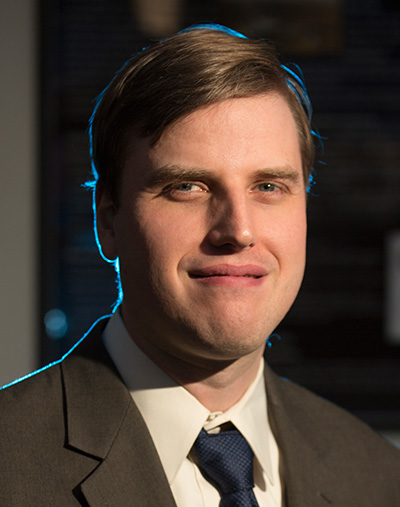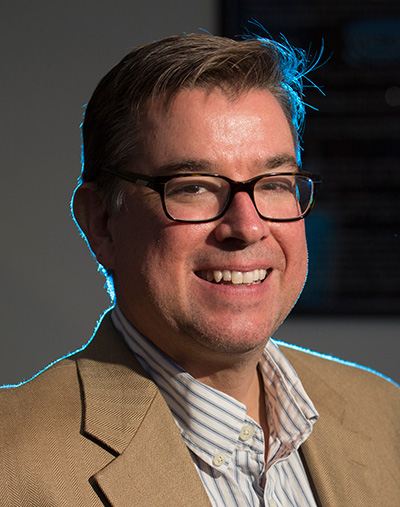CSUF News Service
Finding Gravitational Waves
Titan Scientists Revel in Exciting Discovery
Feb. 11, 2016
Joshua Smith
 Joshua Smith, associate professor of physics, joined Cal State Fullerton in 2010, bringing with him 12 years of experience in gravitational physics. His research has focused on improving the sensitivity of LIGO detectors to increase the likelihood of the first direct detections of gravitational waves. He has secured more than $1.5 million in grants, including a $450,000 National Science Foundation Early Career Development Program award in 2013 — the highest honor given to young faculty scholars for early career research and teaching. Smith also is director of the CSUF Gravitational-Wave Physics and Astronomy Center. He earned his doctorate in physics from Leibniz Universitat in Hannover, Germany, and his bachelor's degree in physics from Syracuse University. Smith also was a postdoctoral fellow at the Albert Einstein Institute in Germany.
Joshua Smith, associate professor of physics, joined Cal State Fullerton in 2010, bringing with him 12 years of experience in gravitational physics. His research has focused on improving the sensitivity of LIGO detectors to increase the likelihood of the first direct detections of gravitational waves. He has secured more than $1.5 million in grants, including a $450,000 National Science Foundation Early Career Development Program award in 2013 — the highest honor given to young faculty scholars for early career research and teaching. Smith also is director of the CSUF Gravitational-Wave Physics and Astronomy Center. He earned his doctorate in physics from Leibniz Universitat in Hannover, Germany, and his bachelor's degree in physics from Syracuse University. Smith also was a postdoctoral fellow at the Albert Einstein Institute in Germany.
"In all of human existence, people have been mystified by the skies. Nearly everything we've learned about astronomy, we've learned from light waves," said Smith. "What I'm most excited about with this first gravitational wave detection, is it opens up a new field of astronomy, where scientists use gravity to see astronomical objects like black holes, neutron stars and supernova explosions. What we'll learn will have long-term benefits to society that are impossible to predict."
Jocelyn Read
 Jocelyn Read, assistant professor of physics, studies the astrophysics of neutron stars — the remnant cores of dead stars that didn't quite have enough mass to end up as black holes. She focuses on how matter behaves at the extremely high densities inside neutron stars and how this might be measured from astronomical observations of X-rays, gamma-ray bursts and gravitational waves. She earned her doctorate in physics from the University of Wisconsin–Milwaukee and a bachelor's degree in mathematics and physics from the University of British Columbia, Canada. Read, who joined CSUF in 2012, completed postdoctoral work at the Albert Einstein Institute in Germany and at the University of Mississippi. Read also is associate director of the CSUF Gravitational-Wave Physics and Astronomy Center.
Jocelyn Read, assistant professor of physics, studies the astrophysics of neutron stars — the remnant cores of dead stars that didn't quite have enough mass to end up as black holes. She focuses on how matter behaves at the extremely high densities inside neutron stars and how this might be measured from astronomical observations of X-rays, gamma-ray bursts and gravitational waves. She earned her doctorate in physics from the University of Wisconsin–Milwaukee and a bachelor's degree in mathematics and physics from the University of British Columbia, Canada. Read, who joined CSUF in 2012, completed postdoctoral work at the Albert Einstein Institute in Germany and at the University of Mississippi. Read also is associate director of the CSUF Gravitational-Wave Physics and Astronomy Center.
"This discovery is especially exciting because it's a massive binary black hole system that many astrophysicists didn't expect," said Read. "This also means that for my own research the best is yet to come: We have solid predictions that Advanced LIGO also will detect binary neutron stars in the next few years. That's when my work will really come into play."
Geoffrey Lovelace
 Geoffrey Lovelace, assistant professor of physics, is a theorist specializing in numerical relativity. His research focuses on using supercomputer simulations to model colliding black holes and the gravitational waves they emit, to help Advanced LIGO and other detectors observe as many of these waves as possible. He earned his doctorate in physics from the Caltech and his bachelor's degree in physics from the University of Oklahoma. Lovelace worked for five years as a research associate at Cornell University before joining the Physics Department faculty in 2012.
Geoffrey Lovelace, assistant professor of physics, is a theorist specializing in numerical relativity. His research focuses on using supercomputer simulations to model colliding black holes and the gravitational waves they emit, to help Advanced LIGO and other detectors observe as many of these waves as possible. He earned his doctorate in physics from the Caltech and his bachelor's degree in physics from the University of Oklahoma. Lovelace worked for five years as a research associate at Cornell University before joining the Physics Department faculty in 2012.
"It's thrilling to see this first glimpse of space and time warping under the most extreme conditions in the universe — just as Einstein predicted a century ago," said Lovelace. "And it’s a tremendous opportunity to involve our students at Cal State Fullerton in the excitement of this discovery."
Alfonso Agnew
 Alfonso Agnew, professor of mathematics, is a Cal State Fullerton graduate who joined the Mathematics Department faculty in 2001. A mathematical physicist, his teaching and research have been motivated by Einstein's general theory of relativity and quantum theory. Agnew is interested in developing, extending and applying mathematical methods to find and study cosmological and astrophysical solutions of Einstein’s equations. Agnew earned his doctorate in mathematics from Oregon State University, and holds bachelor's degrees in mathematics and physics from CSUF.
Alfonso Agnew, professor of mathematics, is a Cal State Fullerton graduate who joined the Mathematics Department faculty in 2001. A mathematical physicist, his teaching and research have been motivated by Einstein's general theory of relativity and quantum theory. Agnew is interested in developing, extending and applying mathematical methods to find and study cosmological and astrophysical solutions of Einstein’s equations. Agnew earned his doctorate in mathematics from Oregon State University, and holds bachelor's degrees in mathematics and physics from CSUF.
"The most exciting thing is being able to witness and be a part of a new and exciting chapter in science that may well revolutionize the field of astronomy/astrophysics," said Agnew. "I started off my research career as a cosmologist, so I am particularly excited to discover what new things and new details that LIGO and other gravitational wave observatories will see in the universe."
